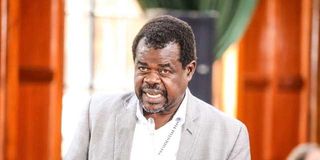Omtatah in court to stop recruitment of IEBC commissioners

Busia Senator Okiya Omtatah at the Supreme Court on September 2, 2022. He wants court to invalidate a law, which paved way for changes in the composition of the IEBC commissioners selection panel.
Busia Senator Okiya Omtatah has moved to court seeking orders to stop the ongoing recruitment of the Chairperson and six members of the Independent Electoral and Boundaries Commission (IEBC).
Mr Omtatah wants the court to invalidate a law, which paved way for changes in the composition of the selection panel that oversees the recruitment of the IEBC commissioners.
He is seeking a declaration that the IEBC (Amendment) Act No.1 of 2023 is unconstitutional because senators disregarded the report of the Senate’s Standing Committee on Justice, Legal Affairs and Human Rights at the time they passed the law in January, this year.
The legal challenge comes amid demands by opposition leader Raila Odinga for halting the recruitment exercise and inclusion of all political parties in the process, though the law already provides for the selection mechanism.
Mr Omtatah’s petition has been certified urgent by High Court judge Mugure Thande, who also directed him to furnish the Attorney-General, Speaker of the Senate and the Selection Panel with the court papers so that they file their responses.
Pending the hearing of the case, Mr Omtatah wants court to suspend all actions and activities of the Selection Panel including the ongoing recruitment of the IEBC chairman and members and any consequential actions and activities.
He also wants court to issue interim order barring the panel, which is chaired by Dr Nelson Makanda, from nominating any persons or forwarding names of the successful nominees to the President for appointment as the Chairperson and members of the IEBC.
Last week the panel announced that 925 Kenyans have applied for the vacant positions of the chairperson and six members of the electoral commission. The position of Chairperson attracted 25 applicants.
Should the panel nominate and forward the names to the President, Mr Omtatah wants court to bar the President from appointing any person as a member of the Commission pending the determination of the lawsuit.
In the petition filed at that High Court in Milimani Nairobi, the senator says the law is invalid because it was passed by senators without considering the report of the Senate’s Standing Committee on Justice, Legal Affairs and Human Rights.
“The Chairman of the Senate's Standing Committee on Justice, Legal Affairs and Human Rights was forced by the Executive to ambush the committee members. He unilaterally ambushed the Committee members and the House when he withdrew the Committee's report which he had tabled on behalf of the Committee, to avoid it being debated and subjected to a vote,” claims Mr Omtatah.
Also Read: Inside Raila's plan to scuttle IEBC process
The Senate passed the law on January 19, 2023 and was assented by President William Ruto on January 23. It came into force on February 6.
Based on the provisions of the said law, President Ruto appointed the seven-member Selection Panel comprising representatives from the Public Service Commission, the Parliamentary Service Commission, the Political Parties Liaison Committee, the Law Society of Kenya, and the Inter-Religious Council of Kenya.
They are Bethuel Sugut, Novince Euralia Atieno, Charity Kisotu, Evans Misati James, Benson Ngugi Njeri, Dr Nelson Makanda and Fatuma Saman.
The panel was tasked with the responsibility of nominating persons for the positions of IEBC Chairperson and Commissioners.
The Panel is set to publish the list, the venue, and the dates for interviewing the shortlisted candidates.
But according to Mr Omtatah, the law was unconstitutionally and unlawfully passed.
“There was no resolution of the Committee to withdraw the Report, even though such resolution would be meaningless because the law does not provide for such,” he alleges.
By withdrawing the report, which had recommended several amendments to the Bill, Mr Omtatah says the Bill was passed without amendment.
“The Standing Orders of the Senate are clear that once a report of a committee is tabled in the House, it must be subjected to a vote where it is either adopted (with amendments if need be) or rejected. There is no mechanism for the withdrawal of a committee report,” he argues.
He adds that the report belongs to the committee as a collective and is not owned by the chairperson to be withdrawn by him/her on his/her whims.
Hence, he states that the withdrawal was against the law and that voided the resultant Act of Parliament.
Since it is at the Committee stage that the Bill was subjected to public participation, he says that the effect of the alleged “withdrawal” of the report was that the Bill was passed without subjecting it to public participation.
His final prayers in the petition is a declaration that the Speaker of the Senate ought to have but failed to reject the withdrawal of the report since it was already the property of the House.
He also seeks a deceleration that, by assenting to the Bill as passed, the President failed in his obligations under Article 115(1) and (2) of the Constitution to refer the Bill back to Parliament for reconsideration by Parliament after satisfying himself that the Bill was not enacted in accordance with the Constitution.
Additionally, he wants a declaration that the IEBC (Amendment) Act No. 1 of 2023 is unconstitutional and, therefore, invalid, null and void “ab initio” and that anything done under the said Act is invalid.
The case will be heard on April 6, 2023.





